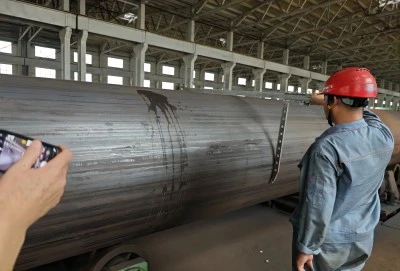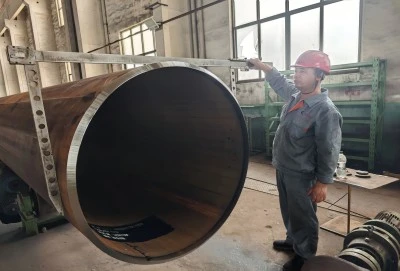|
|
|
API Standards for Carbon Steel Pipe Quality:
The American Petroleum Institute (API) has established rigorous standards for carbon steel pipes used in pipeline applications. These standards ensure that pipes meet specific quality, safety, and performance criteria. The most common API specifications for carbon steel pipes include:
- API 5L: Specification for Line Pipe
- API 5CT: Specification for Casing and Tubing
- API 5D: Specification for Drill Pipe
These specifications cover various aspects of pipe manufacturing, including:
Chemical Composition
API standards dictate the precise chemical composition of carbon steel used in pipe production. This composition typically includes:
- Carbon: 0.22% - 0.26%
- Manganese: 1.15% - 1.60%
- Phosphorus: 0.025% max
- Sulfur: 0.015% max
- Silicon: 0.15% - 0.35%
The exact percentages may vary depending on the grade and intended application of the pipe.
Mechanical Properties
API carbon steel pipes must meet specific mechanical property requirements, including:
- Yield strength
- Tensile strength
- Elongation
- Hardness
These properties ensure that the pipes can withstand the pressures and stresses encountered in pipeline operations.
Dimensional Tolerances
API standards specify strict dimensional tolerances for carbon steel pipes, including:
- Outside diameter
- Wall thickness
- Length
- Straightness
Adhering to these tolerances ensures proper fit and function in pipeline systems.
Non-Destructive Testing
API-compliant pipes undergo rigorous non-destructive testing to detect any flaws or defects. Common testing methods include:
- Ultrasonic testing
- Magnetic particle inspection
- Radiographic testing
- Hydrostatic testing
These tests help identify any potential weaknesses or imperfections that could compromise the pipe's integrity.
How API Carbon Steel Pipes Improve Pipeline Longevity:
API carbon steel pipes offer numerous advantages that contribute to extended pipeline lifespans and improved overall performance. Let's explore some of the key benefits:
Superior Strength and Durability
The carefully controlled chemical composition and manufacturing processes of API carbon steel pipes result in exceptional strength and durability. These pipes can withstand high internal pressures, external loads, and environmental stresses, making them ideal for demanding pipeline applications.
Excellent Weldability
API carbon steel pipes exhibit superior weldability, facilitating easier and more reliable pipeline construction and maintenance. The consistent chemical composition and mechanical properties of these pipes ensure strong, durable welds that maintain the integrity of the pipeline system.
Resistance to Fatigue
The high-quality carbon steel used in API pipes demonstrates excellent resistance to fatigue, a critical factor in long-term pipeline performance. This resistance helps prevent cracking and failure due to cyclic loading and pressure fluctuations.
Temperature Resistance
API carbon steel pipes maintain their mechanical properties across a wide range of temperatures, making them suitable for various applications, from cryogenic services to high-temperature operations.
Cost-Effectiveness
While the initial cost of API carbon steel pipes may be higher than some alternatives, their long-term durability and performance make them a cost-effective choice for pipeline projects. The extended lifespan and reduced maintenance requirements of these pipes often result in significant long-term savings.
Versatility
API carbon steel pipes are available in a wide range of sizes, wall thicknesses, and grades, making them suitable for diverse pipeline applications across multiple industries.
Corrosion Resistance in API Carbon Steel Pipes
While carbon steel is inherently susceptible to corrosion, API carbon steel pipes incorporate several features and treatments to enhance their corrosion resistance:
Protective Coatings
Many API carbon steel pipes are treated with protective coatings to create a barrier against corrosive elements. Common coating types include:
-
Fusion-bonded epoxy (FBE)
-
Three-layer polyethylene (3LPE)
-
Three-layer polypropylene (3LPP)
-
Coal tar enamel
These coatings significantly extend the service life of carbon steel pipes in corrosive environments.
Cathodic Protection
API carbon steel pipelines often employ cathodic protection systems to prevent corrosion. This electrochemical technique uses sacrificial anodes or impressed current systems to protect the pipe from corrosive reactions.
Corrosion Inhibitors
In some applications, corrosion inhibitors are introduced into the pipeline system to form a protective film on the internal surface of the pipe, reducing the risk of internal corrosion.
Regular Inspection and Maintenance
API standards emphasize the importance of regular inspection and maintenance to detect and address corrosion issues early. Advanced inspection techniques, such as inline inspection (ILI) tools, help monitor the condition of pipelines and identify potential corrosion problems before they become critical.
Conclusion:
API carbon steel pipes represent a pinnacle of engineering and material science in the pipeline industry. Their combination of strength, durability, and corrosion resistance, backed by rigorous quality standards, makes them an ideal choice for a wide range of pipeline applications. As global infrastructure needs continue to grow and evolve, API carbon steel pipes are poised to play a crucial role in building reliable, long-lasting pipeline systems that meet the challenges of the 21st century and beyond.
For more information on API carbon steel pipes and how they can benefit your pipeline project, please contact us at info@longma-group.com. Our team of experts is ready to assist you in selecting the right pipe solutions for your specific needs.














